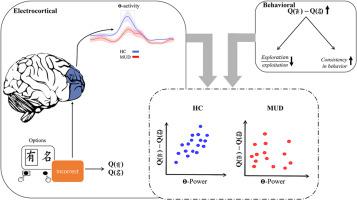当前位置:
X-MOL 学术
›
Neuropsychologia
›
论文详情
Our official English website, www.x-mol.net, welcomes your feedback! (Note: you will need to create a separate account there.)
Dysfunctional feedback processing in male methamphetamine abusers: Evidence from neurophysiological and computational approaches
Neuropsychologia ( IF 2.6 ) Pub Date : 2024-03-08 , DOI: 10.1016/j.neuropsychologia.2024.108847 Sadegh Ghaderi , Jamal Amani Rad , Mohammad Hemami , Reza Khosrowabadi
Neuropsychologia ( IF 2.6 ) Pub Date : 2024-03-08 , DOI: 10.1016/j.neuropsychologia.2024.108847 Sadegh Ghaderi , Jamal Amani Rad , Mohammad Hemami , Reza Khosrowabadi

|
Methamphetamine use disorder (MUD) as a major public health risk is associated with dysfunctional neural feedback processing. Although dysfunctional feedback processing in people who are substance dependent has been explored in several behavioral, computational, and electrocortical studies, this mechanism in MUDs requires to be well understood. Furthermore, the current understanding of latent components of their behavior such as learning speed and exploration-exploitation dilemma is still limited. In addition, the association between the latent cognitive components and the related neural mechanisms also needs to be explored. Therefore, in this study, the underlying neurocognitive mechanisms of feedback processing of such impairment, and age/gender-matched healthy controls are evaluated within a probabilistic learning task with rewards and punishments. Mathematical modeling results based on the Q-learning paradigm suggested that MUDs show less sensitivity in distinguishing optimal options. Additionally, it may be worth noting that MUDs exhibited a slight decrease in their ability to learn from negative feedback compared to healthy controls. Also through the lens of underlying neural mechanisms, MUDs showed lower theta power at the medial-frontal areas while responding to negative feedback. However, other EEG measures of reinforcement learning including feedback-related negativity, parietal-P300, and activity flow from the medial frontal to lateral prefrontal regions, remained intact in MUDs. On the other hand, the elimination of the linkage between value sensitivity and medial-frontal theta activity in MUDs was observed. The observed dysfunction could be due to the adverse effects of methamphetamine on the cortico-striatal dopamine circuit, which is reflected in the anterior cingulate cortex activity as the most likely region responsible for efficient behavior adjustment. These findings could help us to pave the way toward tailored therapeutic approaches.
中文翻译:

男性甲基苯丙胺滥用者的反馈处理功能失调:来自神经生理学和计算方法的证据
甲基苯丙胺使用障碍(MUD)作为一种主要的公共卫生风险,与神经反馈处理功能失调有关。尽管在多项行为、计算和皮层电学研究中已经探讨了物质依赖者的反馈处理功能失调,但 MUD 中的这种机制需要得到很好的理解。此外,目前对其行为的潜在组成部分(例如学习速度和探索-利用困境)的理解仍然有限。此外,潜在认知成分与相关神经机制之间的关联也需要探索。因此,在本研究中,在具有奖励和惩罚的概率学习任务中评估此类损伤的反馈处理的潜在神经认知机制以及年龄/性别匹配的健康对照。基于 Q 学习范式的数学建模结果表明,MUD 在区分最佳选项方面表现出较低的敏感性。此外,值得注意的是,与健康对照组相比,MUD 从负面反馈中学习的能力略有下降。同样通过潜在的神经机制的镜头,MUD 在响应负反馈时在内侧额叶区域表现出较低的 θ 功率。然而,强化学习的其他脑电图测量,包括反馈相关的负性、顶叶 P300 以及从内侧额叶到外侧前额叶区域的活动流,在 MUD 中保持完整。另一方面,观察到 MUD 中价值敏感性和内侧额叶 theta 活动之间的联系被消除。观察到的功能障碍可能是由于甲基苯丙胺对皮质纹状体多巴胺回路的不利影响,这反映在前扣带皮层活动中,它是最有可能负责有效行为调整的区域。这些发现可以帮助我们为定制治疗方法铺平道路。
更新日期:2024-03-08
中文翻译:

男性甲基苯丙胺滥用者的反馈处理功能失调:来自神经生理学和计算方法的证据
甲基苯丙胺使用障碍(MUD)作为一种主要的公共卫生风险,与神经反馈处理功能失调有关。尽管在多项行为、计算和皮层电学研究中已经探讨了物质依赖者的反馈处理功能失调,但 MUD 中的这种机制需要得到很好的理解。此外,目前对其行为的潜在组成部分(例如学习速度和探索-利用困境)的理解仍然有限。此外,潜在认知成分与相关神经机制之间的关联也需要探索。因此,在本研究中,在具有奖励和惩罚的概率学习任务中评估此类损伤的反馈处理的潜在神经认知机制以及年龄/性别匹配的健康对照。基于 Q 学习范式的数学建模结果表明,MUD 在区分最佳选项方面表现出较低的敏感性。此外,值得注意的是,与健康对照组相比,MUD 从负面反馈中学习的能力略有下降。同样通过潜在的神经机制的镜头,MUD 在响应负反馈时在内侧额叶区域表现出较低的 θ 功率。然而,强化学习的其他脑电图测量,包括反馈相关的负性、顶叶 P300 以及从内侧额叶到外侧前额叶区域的活动流,在 MUD 中保持完整。另一方面,观察到 MUD 中价值敏感性和内侧额叶 theta 活动之间的联系被消除。观察到的功能障碍可能是由于甲基苯丙胺对皮质纹状体多巴胺回路的不利影响,这反映在前扣带皮层活动中,它是最有可能负责有效行为调整的区域。这些发现可以帮助我们为定制治疗方法铺平道路。



























 京公网安备 11010802027423号
京公网安备 11010802027423号